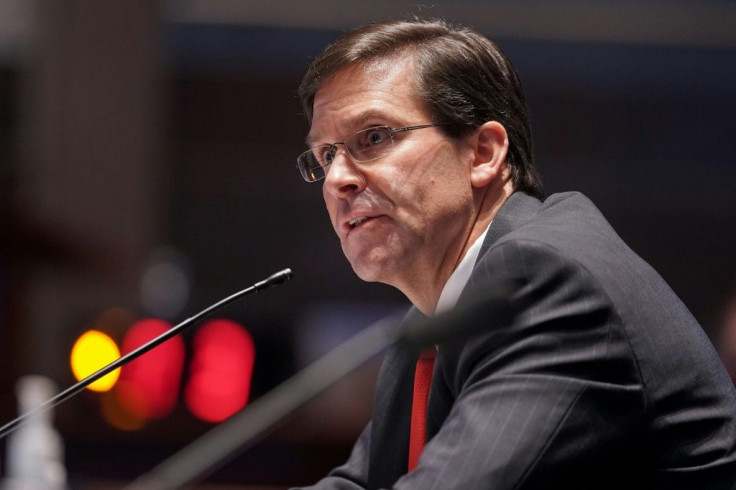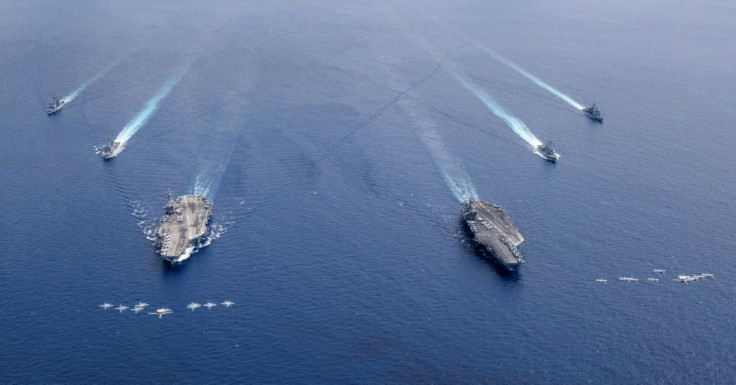US Defense Chief Plans To Visit China As Tensions Grow
US Defense Secretary Mark Esper plans to visit China for talks on how to improve two-way communications in a crisis as geopolitical tensions between the superpowers rise and concerns mount over a potential South China Sea flashpoint.
Esper said Tuesday that he hopes to make the trip before year-end to "establish the systems necessary for crisis communications and reinforce our intentions to openly compete in the international system in which we all belong."
Last week, the United States formally declared Beijing's pursuit of territory and resources in South China Sea as illegal, explicitly backing the territorial claims of Southeast Asian countries against China's.
It has also downgraded relations with Hong Kong after China implemented a new security law in violation of its promises of autonomy for the territory.
"We are not in search of conflict," Esper said in an address to the International Institute of Strategic Studies.
But China "has no right to turn international waters into a zone of exclusion for its own maritime empire," he said.

Beijing has sought to make its claims to much of the South China Sea a de facto reality by building up small shoals and reefs into sizable military bases with long airstrips and deep port facilities.
On July 2, the US Defense Department criticized Chinese military exercises around the Paracel Islands, saying they "further destabilize the situation" in an area also claimed by Taiwan and Vietnam.
Two days later, the Pentagon said two of its own aircraft carriers had carried out drills in the South China Sea to "support a free and open Indo-Pacific," a spokesman said.
On July 13, Secretary of State Mike Pompeo voiced a challenge to China's claims stronger than had previously come out of Washington.
"The world will not allow Beijing to treat the South China Sea as its maritime empire," Pompeo declared in a statement.
"We are making clear: Beijing's claims to offshore resources across most of the South China Sea are completely unlawful, as is its campaign of bullying to control them," Pompeo said.

Esper cited China's militarization of contested South China Sea islands, its sinking of a Vietnamese fishing boat and harassment of Malaysian oil and gas activities, and its protecting fishing fleets that Indonesia says are illegally poaching in its waters.
He also pointed to the People's Liberation Army's recent exercises simulating an attack on Taiwan, increasing incursions into the waters around the Japanese-administered Senkaku Islands, the new security law in Hong Kong, and its tolerance of North Korean trade in violation of a UN embargo.
"Make no mistake, the CCP (Chinese Communist Party) has been engaged in this sort of behavior for many years. But today it's true intentions are on full display for all to see," said Esper.
"While we hope the CCP will change its ways, we must be prepared for the alternative."
"We are committed to a constructive and results-oriented relationship with China and, within our defense relationship, to open lines of communication and risk reduction," he said.
China unsurprisingly accuses the United States of being the destabilizing influence in the region.
"The US military deployment in the Asia-Pacific region is unprecedented," Wu Shicun, president of the National Institute for South China Sea Studies, a government think tank, said in late June.
"The possibility of a military incident or an accidental shot fired is rising," Wu said.
"If a crisis were to erupt, the repercussions on bilateral relations would be catastrophic."
Pentagon spokesman Jonathan Hoffman said Esper's trip to China is still in the planning stage.
"Part of it's going to be, we seek to maintain military-to-military relationships with China and Russia alike. We believe that's incredibly important to avoid misunderstandings in the future."
"What we're going to do is talk to the Chinese... about how there is an international world rules-based order," he said.
"We believe that China and the Chinese people are best served by embracing that order instead of attempting to replace it with a different set of rules."
© Copyright AFP 2024. All rights reserved.





















